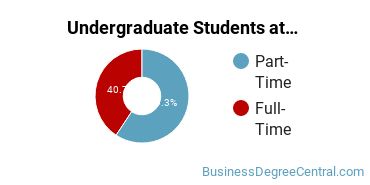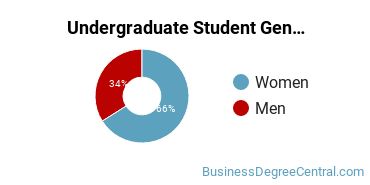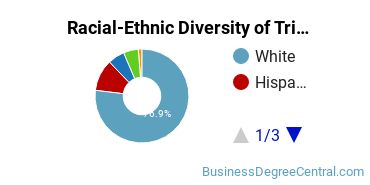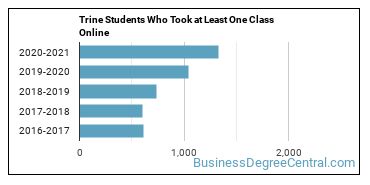Trine University-Regional/Non-Traditional Campuses Business Programs
Trine University-Regional/Non-Traditional Campuses is a private not-for-profit institution situated in Angola, Indiana. Angola is a great place for students who enjoy small town life.
Featured schools near , edit
Where Is Trine University-Regional/Non-Traditional Campuses?

Contact details for Trine are given below.
| Contact Details | |
|---|---|
| Address: | 1 University Avenue, Angola, IN 46703 |
| Phone: | 260-483-4949 |
| Website: | trine.edu |
| Facebook: | https://www.facebook.com/TrineUniversity |
| Twitter: | https://twitter.com/trineuniversity |
How Do I Get Into Trine?
You can apply to Trine online at: www.trine.edu/online/admission/index.aspx
Admission Requirements for Trine
| Submission | Required? |
|---|---|
| High School GPA | 1 |
| High School Rank | 3 |
| High School Transcript | 3 |
| College Prep Program | 3 |
| Recommendations | 5 |
| SAT or ACT Scores | 3 |
| TOEFL | 1 |
How Hard Is It To Get Into Trine?
Approximately 27% of accepted students are men and 73% are women. The acceptance rate for men is 30%, and the acceptance rate for women is 23%.
Can I Afford Trine University-Regional/Non-Traditional Campuses?
Student Loan Debt
While almost two-thirds of students nationwide take out loans to pay for college, the percentage may be quite different for the school you plan on attending. At Trine, approximately 50% of students took out student loans averaging $3,050 a year. That adds up to $12,200 over four years for those students.
Trine University-Regional/Non-Traditional Campuses Undergraduate Student Diversity

There are also 984 graduate students at the school.
Gender Diversity
Of the 156 full-time undergraduates at Trine, 34% are male and 66% are female.

Racial-Ethnic Diversity
The racial-ethnic breakdown of Trine University-Regional/Non-Traditional Campuses students is as follows.

| Race/Ethnicity | Number of Grads |
|---|---|
| Asian | 0 |
| Black or African American | 8 |
| Hispanic or Latino | 17 |
| White | 120 |
| International Students | 2 |
| Other Races/Ethnicities | 9 |
Online Learning at Trine University-Regional/Non-Traditional Campuses
The following chart shows how the online learning population at Trine has changed over the last few years.

This school is the 5th most popular in Indiana for online learning according to the online graduations recorded by the Department of Education for the academic year 2022-2023.
The following table shows the 1-year growth rate of Trine majors that offer at least one online course. This table only includes majors with positive growth.
| Major | 1-Year Growth Rate |
|---|---|
| Accounting | 36% |
| General Business Administration and Management | 12% |
Trine University-Regional/Non-Traditional Campuses Business Concentrations
The table below shows the number of awards for each concentration.
| Major | Associate’s | Bachelor’s | Master’s | TOTAL |
|---|---|---|---|---|
| General Business Administration and Management | 4 | 10 | 113 | 127 |
| Organizational Leadership | 0 | 5 | 20 | 25 |
| Accounting | 1 | 10 | 0 | 11 |
| Interior Design Management | 0 | 9 | 0 | 9 |
| General Human Resources Management/Personnel Administration | 0 | 6 | 0 | 6 |
| Finance | 0 | 1 | 0 | 1 |
| International Business/Trade/Commerce | 0 | 1 | 0 | 1 |
| Marketing/Marketing Management, General | 0 | 0 | 0 | 0 |
| TOTAL | 5 | 42 | 133 | 180 |
References
*The racial-ethnic minorities count is calculated by taking the total number of students and subtracting white students, international students, and students whose race/ethnicity was unknown. This number is then divided by the total number of students at the school to obtain the racial-ethnic minorities percentage.
More about our data sources and methodologies.
Featured Schools
You have goals. Southern New Hampshire University can help you get there. Whether you need a bachelor's degree to get into a career or want a master's degree to move up in your current career, SNHU has an online program for you. Find your degree from over 200 online programs.
Visit School
